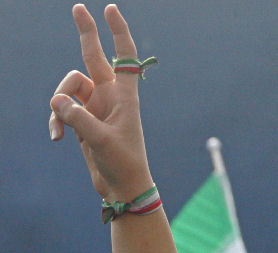Iran: militia violence and secret election brutality
 Lindsey Hilsum
International Editor
Lindsey Hilsum
International Editor
A former member of Iran’s Basij militia describes to Lindsey Hilsum his shame at “watching people die” after disputed elections as Channel 4 News reveals exclusive footage of protesters under fire.

Warning: the accompanying films contain scenes you may find distressing and some flash photography.
The controversial vote which saw President Mahmoud Ahmadinejad returned to power in June 2009 was labelled the “stolen election” by protesters.
He won 62 per cent in the final run-off. His chief opponent Mir-Hossein Mousavi received 34 per cent, despite a groundswell of support and the attempted “green” revolution.
Mr Ahmadinejad was then reinstalled as leader by Iran’s Supreme Leader Ayatollah Khameni, against a backdrop of protest rallies.
In an exclusive report from the streets of Tehran, International Editor Lindsey Hilsum revealed previously unseen footage of Iranian paramilitaries shooting on campaigners.
On his website, Mr Mousavi said President Mahmoud Ahmadinejad’s future government would be “illegitimate” and in another article, Mousavi wryly observed the deafening silence from senior Shia clerics.
It is because they cannot lie before God, he suggested.
Mr Mousavi demanded the release of detainees that he called “the children of the revolution”, language pointedly suggesting a betrayal of the ideals of the Islamic Revolution.
Student Neda Agha-Soltan became a martyr of the Iran opposition when her death, during a rally, was captured on video and quickly spread across the world via the internet and foreign media.
Her death has become a symbol of the struggle to bring down President Ahmadinejad.
Death of Neda: an ‘awakening’ in Iran
Basij member describes election abuse
A defecting member of the Basij militia, the men who wounded and killed in the aftermath of the June 2009 elections, has spoken to International Editor Lindsey Hilsum about what he had witnessed during and after the disputed poll. He is now seeking refuge in the UK.
He described the detailed and brutal orders the Basij were given to ensure President Mahmoud Ahmadinejad remained in power.
He told Channel 4 News: “In truth the orders didn’t come after the election. The orders for all that you witnessed came before the election.
“We were prepared. But we didn’t ever imagine that people’s actions would be so great. We had received orders regarding student activities.
“From three or four months before the election we had attended classes on ideological and political thought and crowd control.
“We knew what we had to do but nothing prepared us for what we saw.”
“There were severe clashes in the first few days, and so new orders were given for forthcoming days.”
Click here for full transcript and video in English and Farsi.
“I’m in complete turmoil all the time. I spent more than twenty years raised like this, and before me a household of martyrs. I keep thinking, which is right? What I’ve chosen now, or the path they’ve taken.
“We are a prominent religious family – always there on the frontline, always with memories of war, frontline and revolution. Since these events I keep thinking, who is right?”
“The pain and the shame in front of people and before God. I’ve lost my world and my religion.
“I never thought that these matters could be contaminated like this.
“I thought that I was continuing the path of my uncles and our martyrs. All my interest and enthusiasm: to have the integrity for martyrdom.
“The pain and the shame in front of people and before God. I’ve lost my world and my religion.”
“We really saw ourselves as upstanding and separate from others. We really believed that what we did was correct, that we were serving the people, that we were serving God and that our mission was nothing but worshipping God.
“But now I am ashamed in front of people, even say that I was mistaken, and I am ashamed in front of my religion. I committed crimes, knowingly and unknowingly. “Now I’m left with my conscience punishing me for what I did.
“I hope that God and people forgive me.”
-
Latest news
-
As India goes to the polls in the world’s largest election – what do British-Indians think?6m

-
Tees Valley: Meet the candidates in one of the biggest contests coming up in May’s local elections4m

-
Keir Starmer says public sector reform will be a struggle7m

-
Nicola Sturgeon’s husband Peter Murrell charged with embezzlement of funds from SNP1m

-
Ukraine might finally get $60billion in American weapons and assistance to defend against Russia3m

-




